M’sian ecommerce solutions startup Borong to invest RM75 million into Sarawak, here’s why

For the Sarawak Digital Economy Corporation (SDEC), a government-owned company, the mission is straightforward—to propel Sarawak’s digital economy.
Now joining this effort is Borong, a Malaysian B2B ecommerce solutions provider and platform aggregator. Touted as Southeast Asia’s fastest growing wholesale marketplace, it facilitates over 100,000 businesses’ trade and procurement locally and regionally.
Formerly known as Dropee, the startup has signed a Memorandum of Understanding (MoU) with SDEC along with five other companies at the International Digital Economy Conference today, October 17.
The MoU signing officiates Borong’s partnership with SDEC and their commitment to invest RM75 million to enable digitalisation across Sarawak’s MSMEs, boosting its local businesses’ growth.
The signing was completed by SDEC’s CEO, Dato Ir. Ts. Sudarnoto Osman, and Borong’s co-founder, Aizat Rahim.
Digitalising the economy
With this investment, Borong targets to transform over 60,000 MSMEs through providing digital tools and resources that bring their businesses from offline to online.
Borong will also be assessing MSMEs’ digital readiness and conduct awareness, digital training, and onboarding activities together with SDEC.

“The goal is to prepare these local businesses to utilise Borong’s ecommerce and marketplace platform to increase their global reach and competitiveness,” a press release stated.
Once onboarded to the Borong ecosystem, these MSMEs are qualified for a SME financing programme called Digital Niaga. Made in collaboration with development banks such as BSN, Bank Rakyat, and Agrobank, it’ll allow them easy access to affordable financing that could go as low as 4% per annum.
According to the press release, Borong and its banking partners to date have allocated over RM300 million in SME financing ready to be deployed and utilised.
The Digital Niaga programme is aligned with the MADANI Economy aspirations to develop local MSMEs into regional champions. By providing the necessary resources to drive their export potential, this initiative will go towards positioning Malaysia as the world’s top 30 largest economies.
Becoming a digital economy powerhouse
“These MOUs represent a critical step in Sarawak’s journey toward becoming a digital economy powerhouse,” SDEC’s Dato Ir. Ts. Sudarnoto Osman said in the press release. “These collaborations are about more than just technology—it’s about empowering the community through digitalisation.”
Incorporated in January 2018, and operationalised in July 2020, SDEC’s vision is to accelerate economic prosperity for all people through digitalisation.
With the help of Borong, hopefully SDEC will be able to better actualise its vision and establish Sarawak as a digital economy powerhouse like the CEO said.
Also Read: SDEC 2024 will explore the latest trends in semicon, AI & ecommerce, here’s how to join
Featured Image Credit: Borong
Singapore’s Love, Bonito lays off 29 roles, including 14 locally
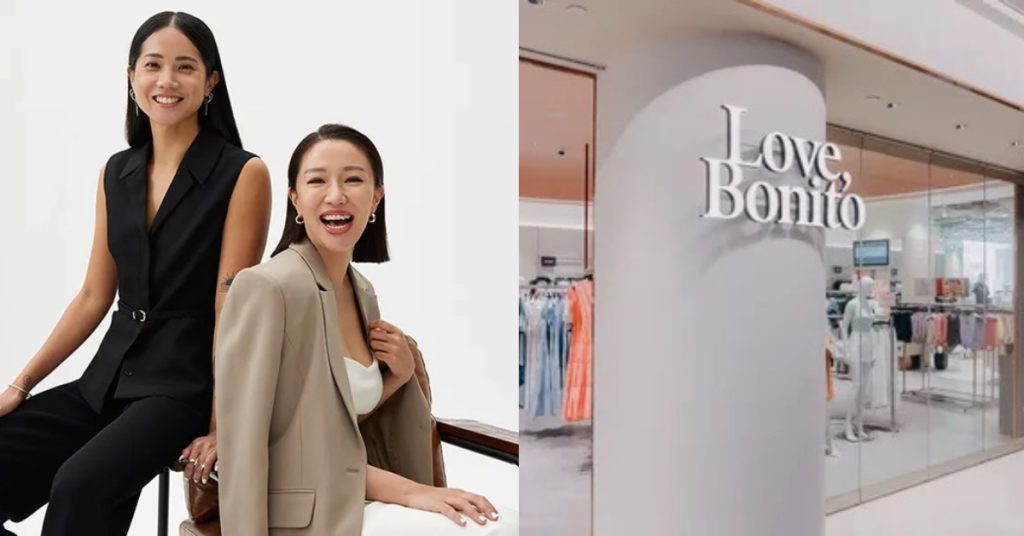
Singaporean fashion retailer Love, Bonito has axed approximately 6.9% or 29 corporate roles within its global workforce, with 14 roles in Singapore impacted.
According to an article by CNA published today (October 17), the homegrown brand explained that the brand’s “immediate focus will be on helping impacted individuals as well as remaining employees through this transition phase”.
Dione Song, CEO of Love, Bonito, told CNA that affected employees will receive a supportive package “in line with local regulations”.
“This includes a payout based on length of service, including encashment of pro-rated annual leaves and notice period.”
The company will also extend impacted staff’s medical insurance, work with relevant agencies to provide career transition support, and write recommendation letters.
Currently, Love, Bonito has 26 stores across Asia: Singapore, Malaysia, Indonesia, Cambodia, Hong Kong, and the Philippines.
First launched as a blogshop in 2005 under Bonito, Chico, the brand has since adopted an omnichannel model and made a name locally and globally as one of Singapore’s recognisable brands.
In 2021, the company announced that it secured US$50 million in Series C funding as it eyed IPO listings and expansions into international markets like the United States.
In 2023, the brand opened its largest outlet in Hong Kong, where it saw a triple-digit year-on-year growth during the first half of that year.
Also Read: Despite profitability claims, ONE Championship axes jobs including S’porean ones
Featured Image Credit: Love, Bonito
Despite profitability claims, ONE Championship axes jobs including S’porean ones

Mixed Martial Arts (MMA) organisation ONE Championship laid off an unspecified number of employees yesterday (October 16), including those from its Singapore headquarters.
In an article published by The Straits Times, a virtual meeting was held with employees from all its offices yesterday morning. Chatri Sityodtong, CEO and founder of ONE Championship, announced the cuts. Those affected were to receive a call from their department heads, with the cut-off time being 7PM Singapore time.
On Wednesday, ONE Championship made the decision to lay off a few dozen employees as part of its overall strategic plan to bring the company to profitability in the coming months.
This decision was not made lightly and reflects our ongoing commitment to streamlining operations and focusing on long-term sustainability and growth.
A ONE Championship spokesperson responding to The Straits Times‘ media queries
An internal email was sent soon after, with the CEO announcing the layoff of “a few dozen superstar teammates” as “part of the overall strategic plan to bring ONE to profitability in the coming months.”
In the email, it stated that the layoffs were made despite the company being “on the verge of profitability through a combination of record revenues and cost efficiencies” as the “external global macroeconomic environment remains both challenging and uncertain” while the “capital markets continue to demand immediate profitability and profit maximisation”.
“Please know that your leaders and I weighed this difficult decision with painstaking detail and heartfelt empathy,” the email stated.
According to its LinkedIn profile, the company has a global staff strength ranging between 201 and 500. Besides Singapore, it has offices in Tokyo, Los Angeles, New York, London, Shanghai, Milan, Bangkok, Manila, Jakarta, and Bengaluru.
Its institutional investors include Temasek Holdings.
Rumours of layoffs were circulating internally
Although the company has not disclosed the exact number of employees affected in Singapore, an anonymous source familiar with the matter indicated that over 20 staff members, spanning departments like broadcast, e-sports, finance, marketing, and public relations, were laid off.
Here’s what this employee had to say:
It’s been a rumour for a long time that there were going to be layoffs. So I guess we weren’t really surprised it happened. I am surprised it happened to me.
There have also been rumours that the company is looking to move most of its operations to the Philippines or Thailand.
There is not much else to be said other than it was a great ride. I enjoyed my work. I enjoyed working with my good colleagues.
An affected employee sharing their thoughts on the layoffs to The Straits Times
Retrenched staff will receive severance pay and have their benefits extended to the end of the year, including their Evolve membership, access to Evolve gyms, and corporate health insurance. Those with stock options will have a 24-month window to exercise them.
However, it is worth noting that Chatri announced on social media in June that ONE will turn profitable and achieve positive cash flow in the third or fourth quarter of 2024.
A report by Bloomberg published this Monday (October 15) stated that according to sources, Group One Holdings, the company behind ONE Championship, had raised at least US$50 million (S$65.5 million) from investors, including Qatar Investment Authority.
Touted as Asia’s largest global sports media platform
ONE Championship was founded in 2011, and it held its inaugural event at the Singapore Indoor Stadium that same year. The company has since hosted nearly 300 live events across 13 countries and territories throughout Asia.
Over the years, it has housed many household MMA names, notably Demetrious Johnson and Eddie Alvarez, and nurtured stars of its own like the Lee siblings Angela and Christian, who have fought under the Singapore flag.
The company has been ambitious with its expansion plans. In 2019, the company launched two key business divisions: ONE Studios, its TV and film production arm, and ONE Esports in April and July, respectively.
However, the COVID-19 pandemic has heavily impacted the business, resulting in the company axing 20% of its global workforce in 2020.
Also Read: The One Behind ONE Championship: How He Built A US$1B Company Out Of His Love For Martial Arts
Featured Image Credit: ONE Championship
This S’porean biz isn’t just making bar soaps, it’s saving the environment while at it too
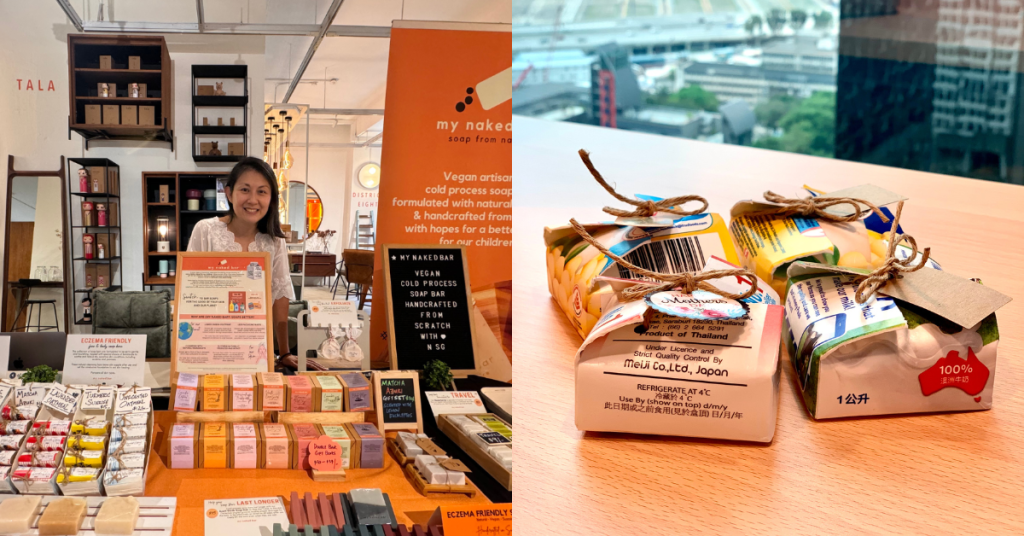
A mum of two, Li Ting graduated from NTU in Business Studies with a specialisation in marketing. She later received her MBA from Rice University Houston.
Professionally, she has a wealth of experience in travel retail, regional logistics sales, and digital marketing in the healthcare industry.
In short, Li Ting is a multi-hyphenate with a plethora of achievements. So, how did she add being the solo entrepreneur behind the vegan soap brand My Naked Bar to the list, too?
It started as a gift
At the end of 2018, Li Ting was searching for a Teachers’ Day gift for her children’s educators. She wanted a gift that showed her appreciation and could be put to good use.
“My biggest fear is that they would look at my gift, have too many of the same item or have no use for it, and be in a dilemma about what to do with it,” she explained.
That was when she had a lightbulb moment—handmade soap bars. Thoughtful, essential, and consumable, these would make ideal gifts.
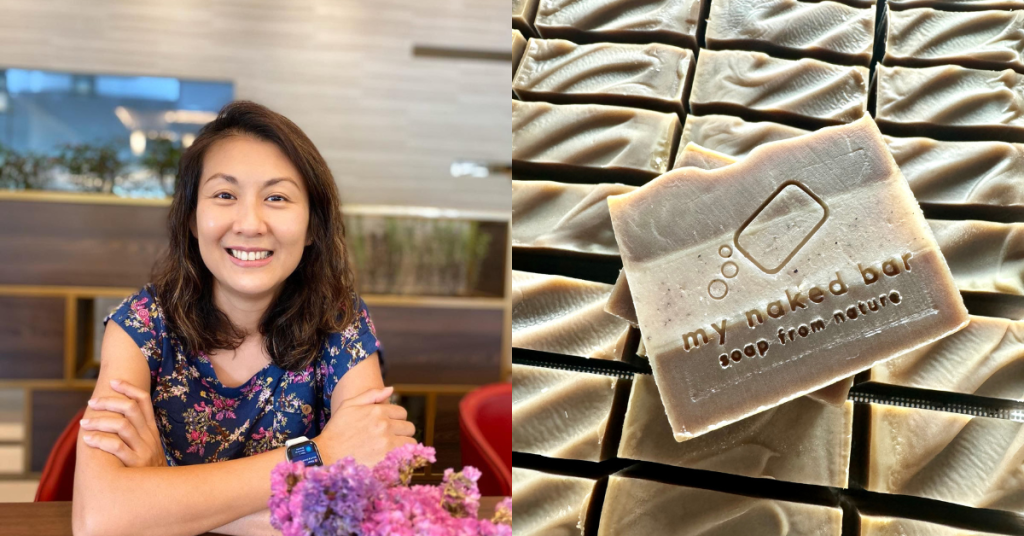
With that idea, Li Ting took up a course to learn the skills and found a shared studio to craft the soaps for the teachers. From there, she continued experimenting and crafting batch after batch of soaps.
“I ended up with so many bars that my immediate family couldn’t use them up, and I started giving them to family and friends,” she confessed. “Many of them came back to tell me how much they loved my soaps, some even sharing that the soaps helped with their sensitive skin conditions.”
But that feedback alone wasn’t enough motivation for her to start a business.
Rather than the actual efficacy of the products, it was the environmental implications that triggered My Naked Bar.
Finding her why
Reading that plastic takes 500 years to break down, Li Ting was awakened to the issues around global warming and the 2030 Paris Agreement. She followed Greta Thunberg’s weekly strikes and kept up with climate matters overseas since there wasn’t much talk about the issue locally.
“That fact disturbed me because while the issue seems so urgent and critical, nobody around me seems to be concerned or even aware,” she said.
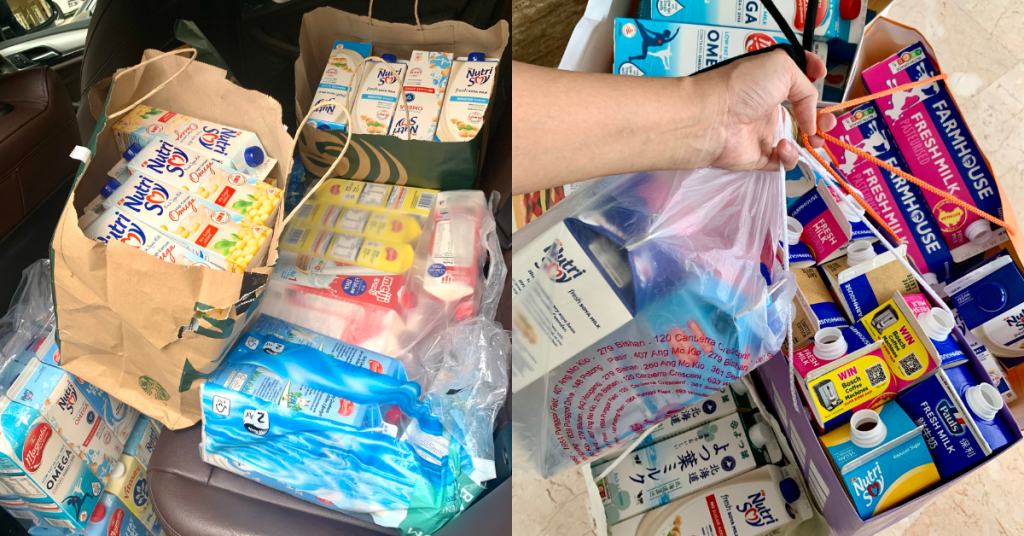
With handcrafted bar soaps, Li Ting could encourage more people to transition to a zero-waste swap and reduce the number of single-use disposable shower gel bottles.
Yet, making bar soap alone wasn’t strong enough for her to start something serious. That’s when the packaging comes into play.
The packaging needed to have a lower carbon footprint than plastic bottles. That’s not as easy as it sounds, because plastic’s carbon footprint isn’t necessarily lower than that of paper or other substitutes.
“I was really afraid I’d end up incurring bigger waste for the planet despite my good intentions,” she said.
That’s when she had her second light bulb moment—milk cartons.
Got milk?
A household item, milk cartons are waterproof inside and can withstand thorough cleaning and reuse.
The milk cartons come entirely from the community. It started with Li Ting’s neighbour, then she began to call for contributions via Package Pals, Facebook groups, and the Upcircle app.
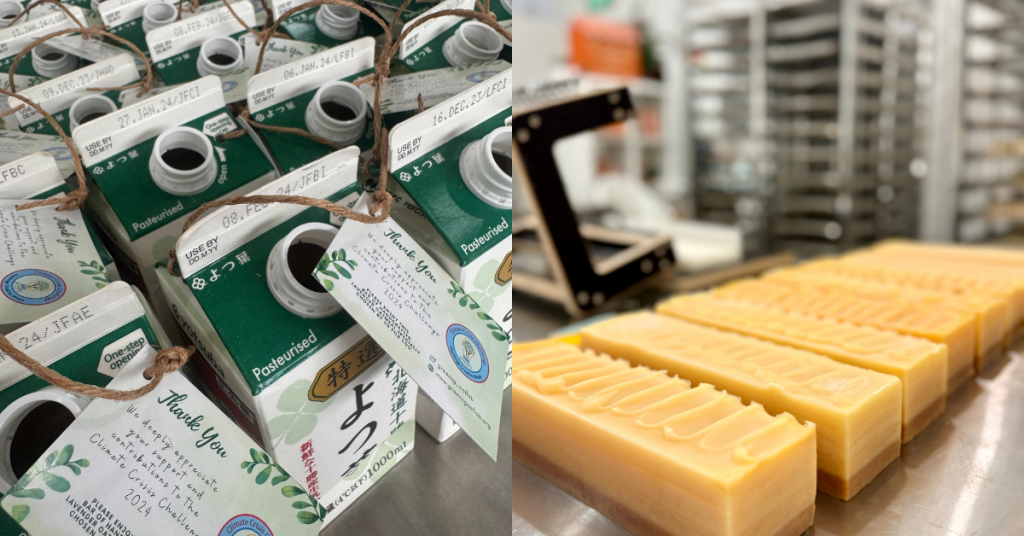
Many have asked why she doesn’t go directly to cafes or suppliers to collect cartons in bulk.
Her answer? “With every contributor, the ripple tribe grows, and our voices get louder. It’s not the end that we are chasing, but rather the process and the momentum we can build.”
Each carton is rinsed and dried thoroughly immediately after consumption before being passed to Li Ting. All parts of the carton are utilised.
The regular bars use the bottom of the cartons, while the FAB erasers (a fabric stain remover soap bar) use the middle portion as a sleeve. The top of the carton is inverted and used as a dish for the kitchen dish soap, allowing water to drain out from the spout.
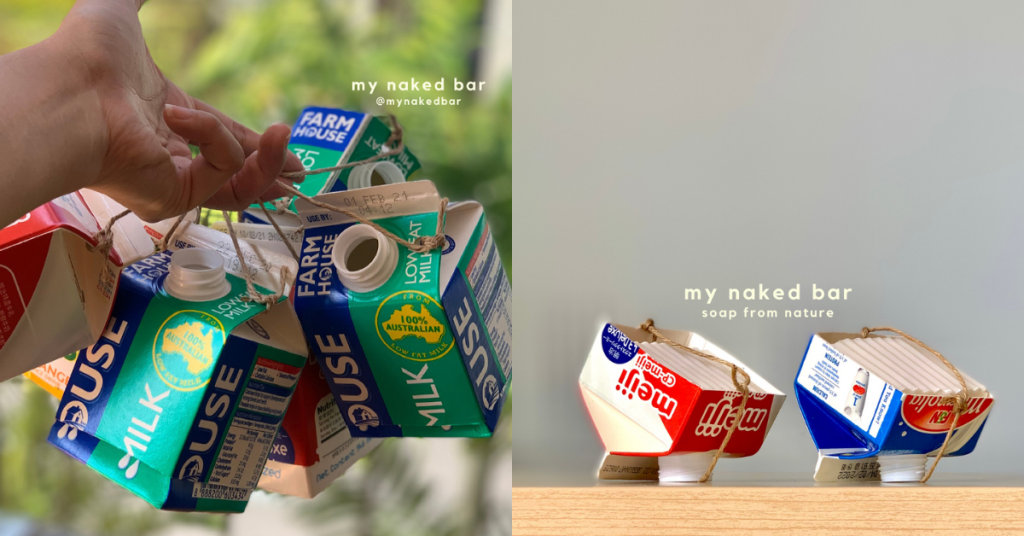
Aside from their website, My Naked Bar can be found in consignment stores such as The Green Collective or Unpackt.
At The Green Collective, due to insufficient cartons, Li Ting had to pack her bars in sleeves. “We are hoping that with more contributions, we can one day revert the packaging at The Green Collective back to our regular milk carton boxes.”
My Naked Bar also uses low-waste packaging like Kraft boxes, paper wraps, sleeves, and mailer boxes, typically for festive gifting and in department stores.
“I decided to provide these options as I remind myself that our upcycled packaging is really not the norm, and I never want to refuse any potential bar soap users just because of my insistence,” she said.
“I believe that as long as we welcome new bar soap users, one day they will be able to accept our upcycled packaging and be open to embarking on their own sustainable lifestyle.”
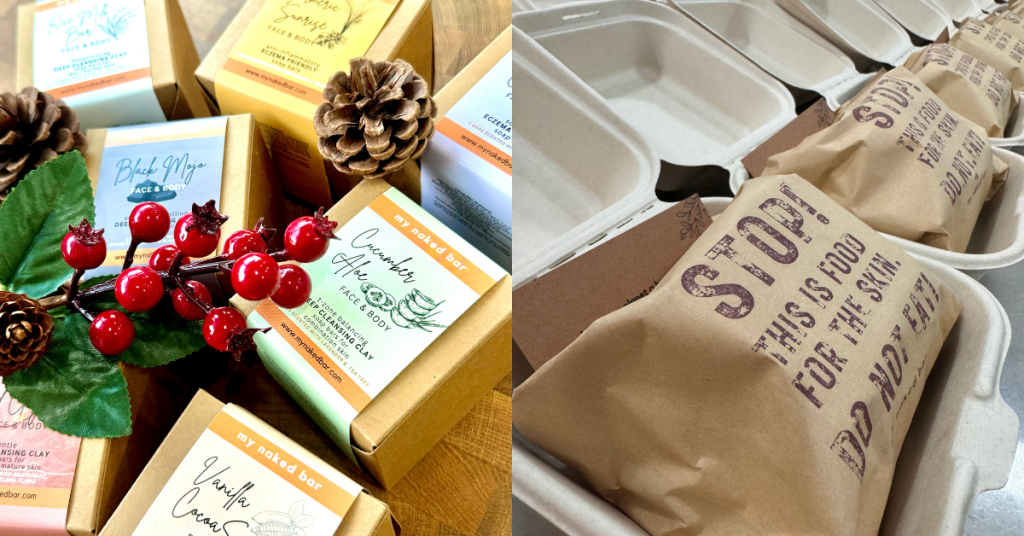
Scaling up for a greener future
At full capacity, My Naked Bar can craft upward of a thousand soap bars per week. With solopreneur Li Ting handling everything, she often finds insufficient time to craft soaps.
Along with the packaging constraints, scaling My Naked Bar has been one of the biggest challenges.
That’s why, going forward, Li Ting hopes to hire a team.
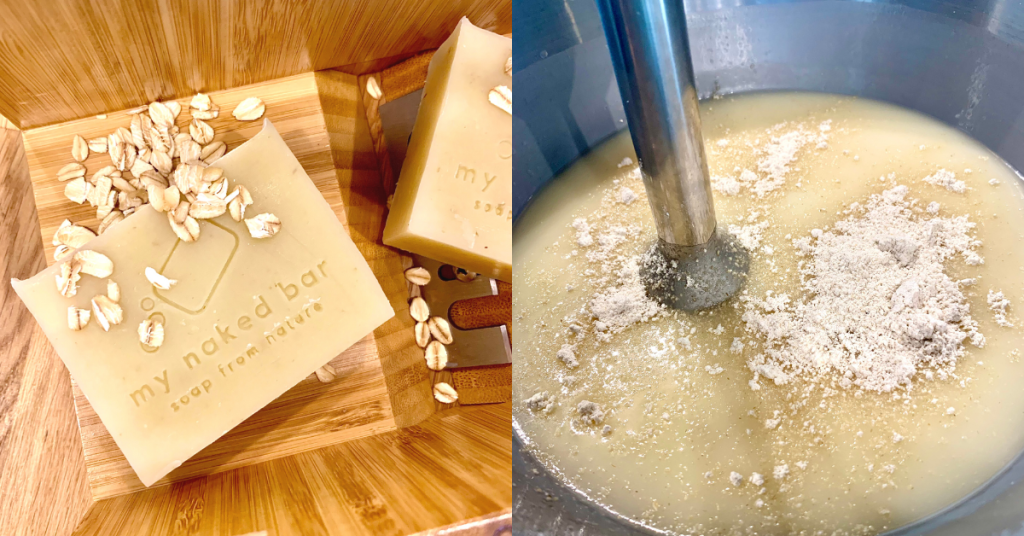
“One of my biggest motivations to scale is to be able to benefit communities such as the retirees, as well as caregivers of disabilities or PWID themselves,” she said. “We hope to provide tasks that can meaningfully engage them so they feel more fulfilled and contribute to the cause at the same time.”
In the meantime, she aims to reach out to more consumers via online and pop-up events.
On that note, My Naked Bar’s products will be in Tangs at Tang Plaza from mid-October to the end of December.
“Our #SoapsinMilkcartons were specifically being requested, so it’ll be the first time they make their public appearance in a major department store,” Li Ting said.
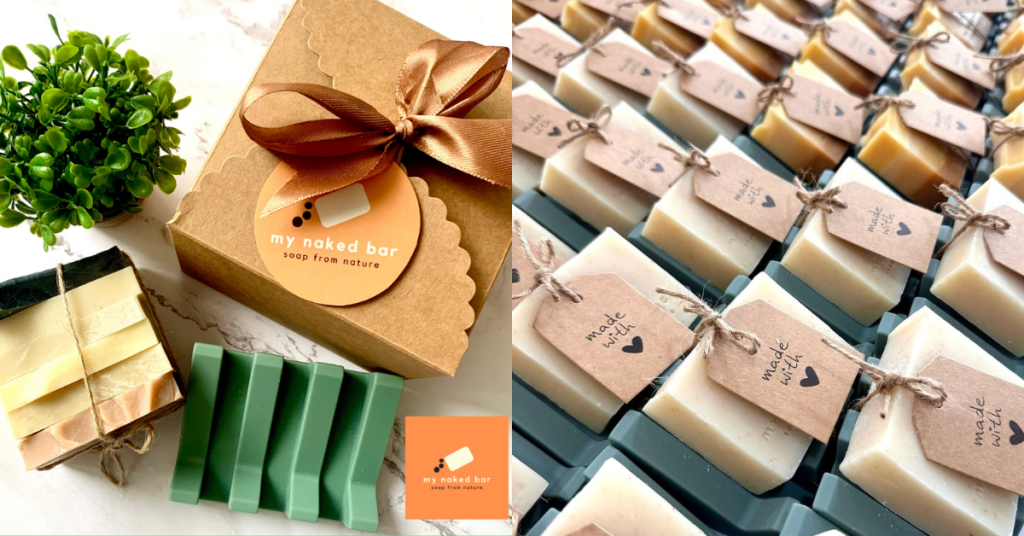
Tackling eco-anxiety
The problem is, do people care?
“I believe that people generally do care, but most of us are just so bogged down with the demands from our work, family, etc. that we have no bandwidth to digest the heavy topic,” Li Ting reasoned.
My Naked Bar’s milk carton packaging plays into that. As something out of the norm, people may stop in their tracks, do a double-take, and start a conversation.
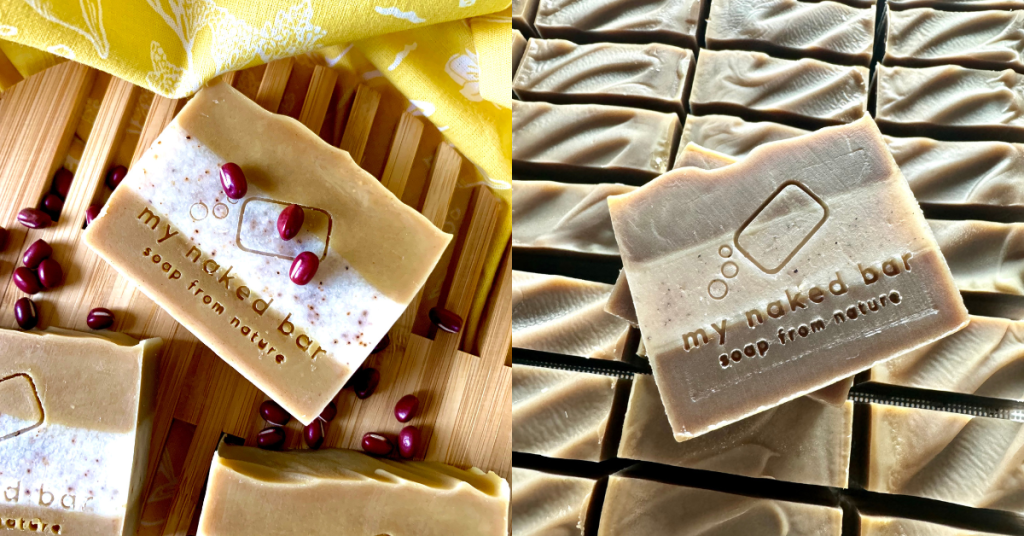
In any case, much has changed since My Naked Bar’s inception. Compared to five years ago, there’s now widespread awareness around the climate crisis.
Yet, there is still a big gap in the real attitudes and habits of the majority of Singaporeans. They may be aware of the issue but have not made real changes to their lifestyles.
“There is also a need for both corporations and individuals to avoid chasing the sustainability trends and to go a level deeper to ensure true impact in their actions,” Li Ting said.
But many still might experience eco-anxiety. To that, the soapmaker’s advice would be to turn that anxiety into action, no matter how small.
“If we can’t be the solution, then let’s be less of the problem,” she said. “Every little effort counts because you never know who you might be inspiring, and soon we have a bigger community.”
- Learn more about My Naked Bar here.
- Read other articles we’ve written about Singaporean startups here.
Also Read: They found accidental success making cake-shaped soaps, clients include S’porean gov
Featured Image Credit: My Naked Bar
Despite a cafe closure, this M’sian honey brand’s ambitions live on with its 10 other stores
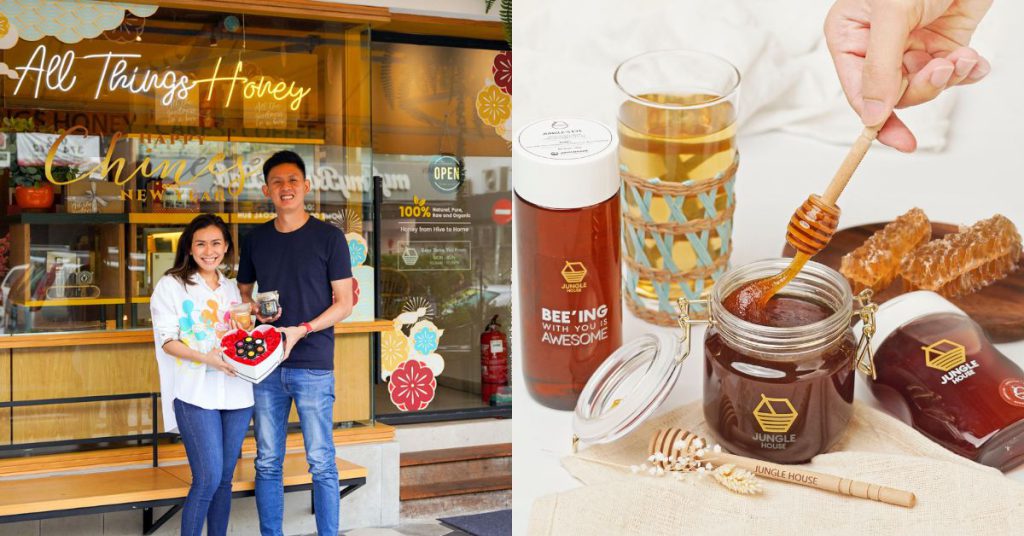
When Paul Poh and Ashley Lam decided to launch Jungle House in 2018, their mission was simple but powerful: to promote a healthier lifestyle through honey.
As a husband-and-wife team, they set out to discover unique honey varieties around the world, and they found their hidden gems close to home—in Indonesia’s mono-floral farms.
It’s where bees gather nectar exclusively from specific flowers, resulting in unique honey types like strawberry honey and mango honey, each carrying its own flavour and benefits.
Their passion for honey has guided Jungle House from a humble mall outlet in Penang to a recognisable brand with 10 retail stores across Malaysia with an all-things honey concept.
But the road to success hasn’t been without its challenges—and lessons learnt along the way.
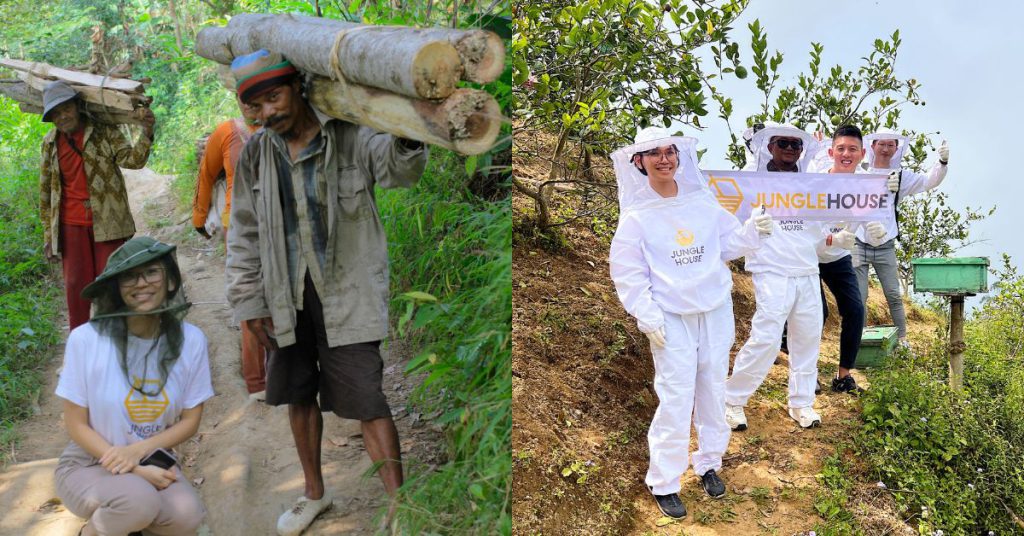
Expanding through challenges
Paul, with a background in engineering and a previous startup in the renewable energy sector, and Ashley, a honey industry veteran, used their collective experiences to grow the business.
When they opened their first store in Queensbay Mall, they faced the difficulties that come with being a local brand.
“It wasn’t easy because when we are a local brand, most malls won’t give us the opportunity even when they have empty lots.”
“However, the lot we were offered belonged to a private owner, so we were able to launch our first store in the mall,” they told Vulcan Post.
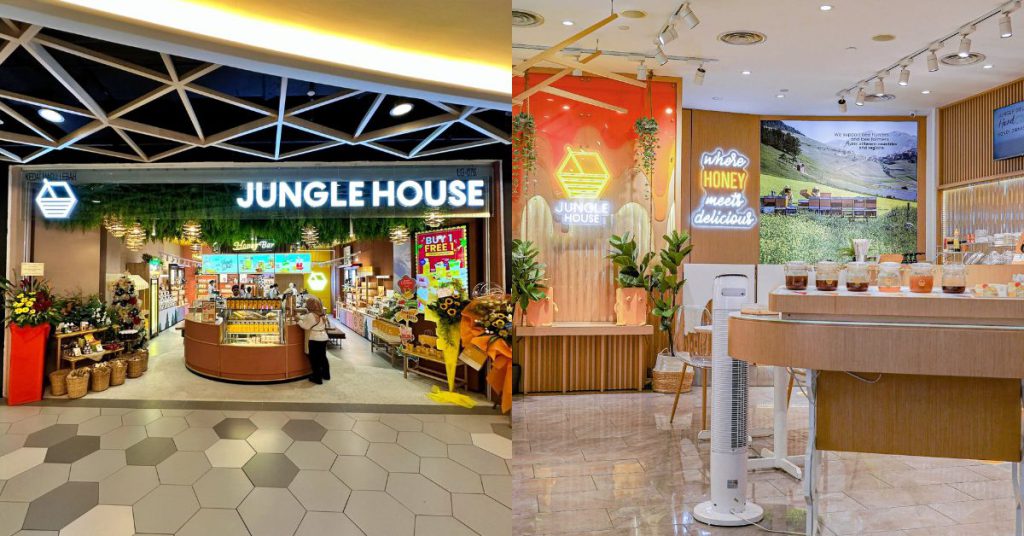
Once they established themselves, more opportunities came. Jungle House spread its wings into shopping malls across the Klang Valley, tapping into a growing market for health-conscious products.
But the real test came when they ventured into opening a honey-themed cafe in the heart of Bangsar during the pandemic.
Sweet but bittersweet
When the first Movement Control Order (MCO) ended in 2021, the team saw an opportunity—a vacant lot in Bangsar, a prime area for lifestyle cafes. They decided to take the plunge, opening their first concept cafe serving honey-infused meals like honey-roasted chicken and honey croffles.
However, this sweet dream soon faced harsh realities. Parking was a nightmare for customers, and the location, while glamorous, didn’t generate the consistent foot traffic they had hoped for.
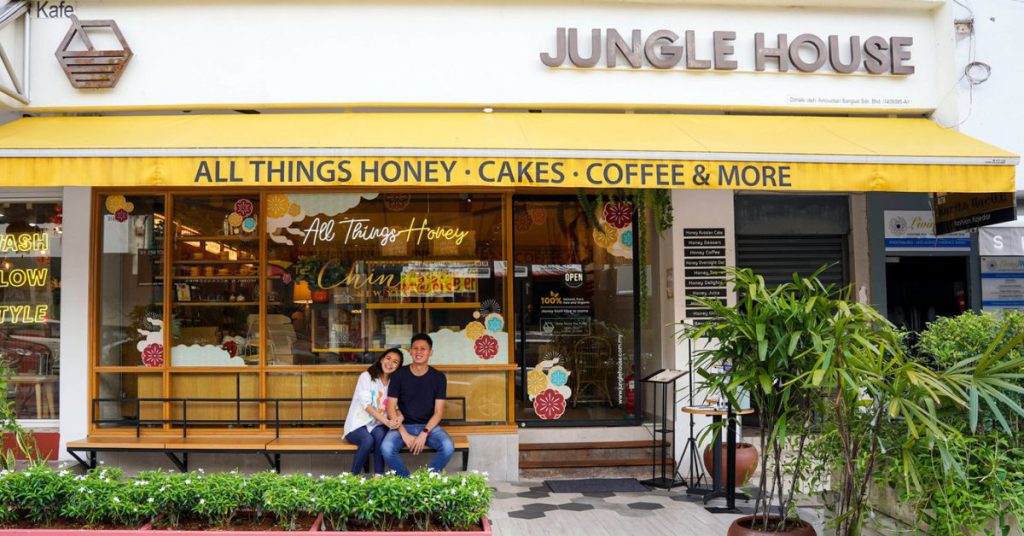
“Because of the location, the business was only good during weekends,” said the founders.
The pandemic also threw a wrench in their plans. While delivery options helped keep the cafe afloat, it was clear that the business model wasn’t sustainable at that location.
In the end, they made the tough decision to close the cafe when the lease expired. But Paul and Ashley didn’t view this closure as a failure; instead, it was a valuable learning experience.
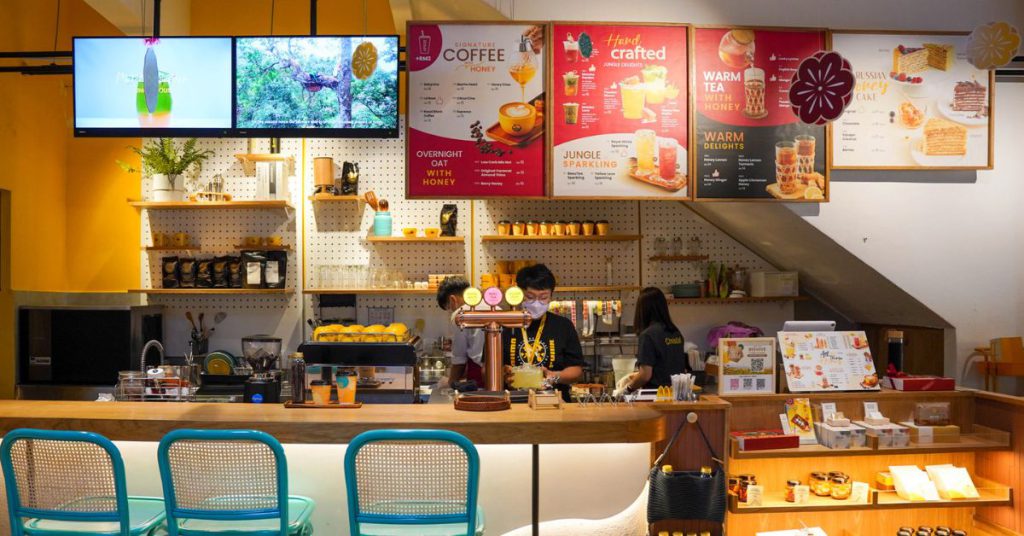
Location is everything—an insight Jungle House learnt the hard way.
“We didn’t do our studies enough about the location when we thought of the concept. We just thought we were a lifestyle cafe; it should be well-fitted into the highly sought-after Bangsar area,” Paul and Ashley shared.
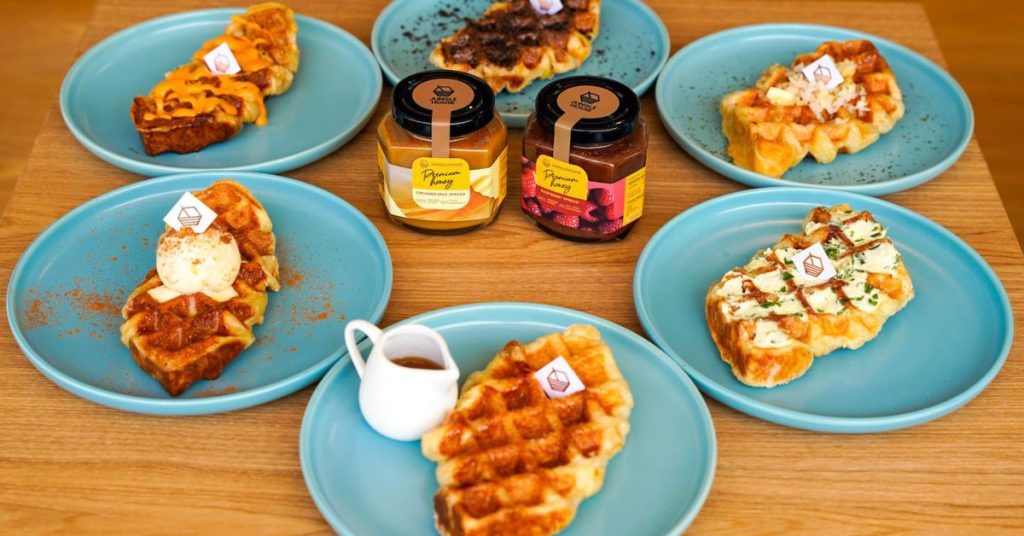
Despite the closure of the Bangsar cafe, they didn’t lose sight of their long-term goals. They focused on studying potential locations more thoroughly, understanding not just the market but also customer accessibility, parking, and ease of visibility.
Their latest store in Mid Valley Megamall is a shining example of how those lessons paid off. Situated in a prime location within the mall, it has become their biggest and most successful retail store to date.
“However, we are actively searching for a new location to revive our honey cafe, and we hope to open one very soon to serve everyone again,” they said with hope.
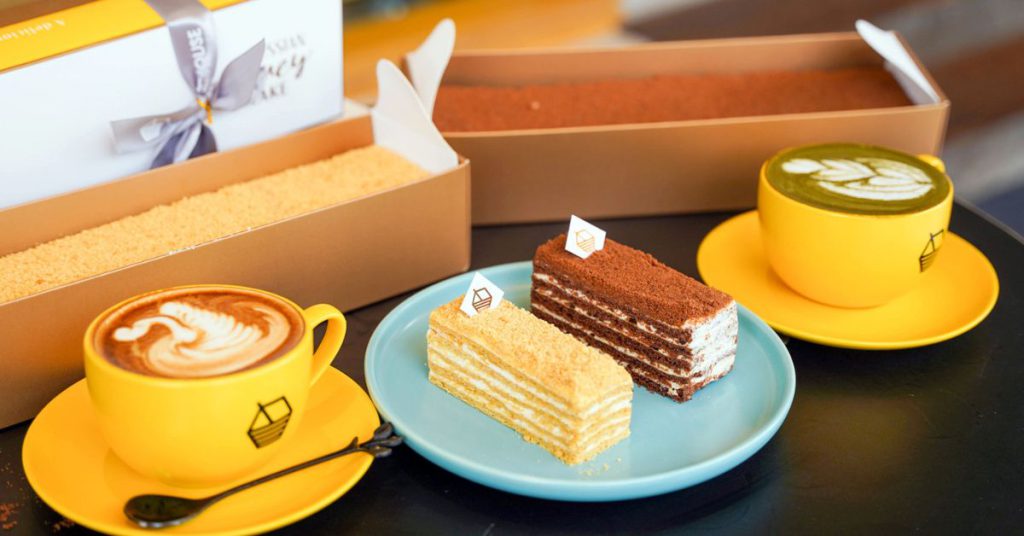
“For now, we still focus on opening stores in shopping malls, where we are more familiar with the business game.”
Embracing ecommerce and innovation
Well, it was not only the cafe closure they had to deal with. Like many businesses, Jungle House had to adapt quickly during the pandemic.
“MCO was the toughest for us. At that point in time, we rely on a single channel, which is retail. But during MCO, malls are the first to be locked down,” the duo said.
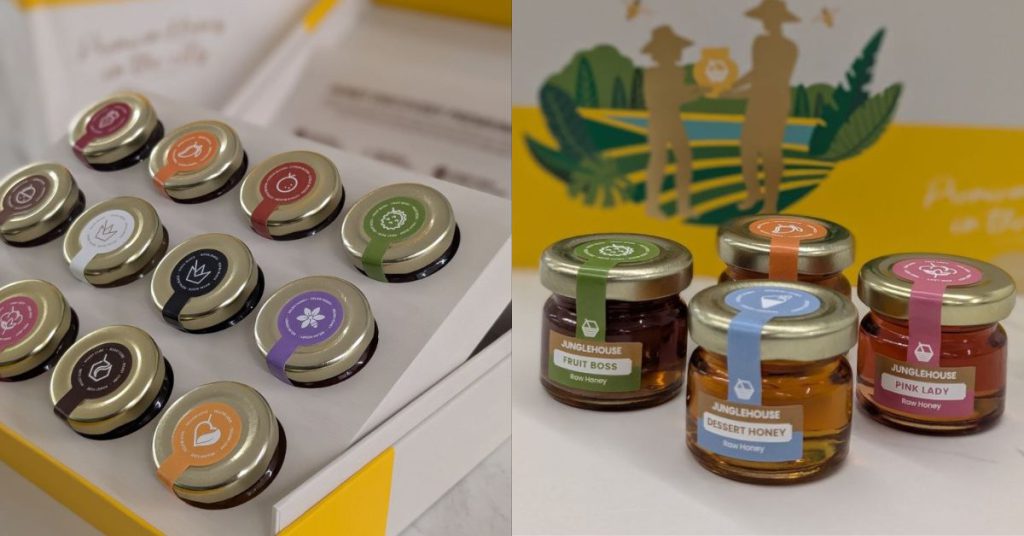
With malls closed and foot traffic reduced, they turned to ecommerce. While online sales have grown, it’s still a work in progress.
One challenge with selling honey online is that customers often want to taste the product before making a purchase.
Paul and Ashley are exploring solutions, such as offering sample sachets to give potential customers a taste of what Jungle House has to offer.
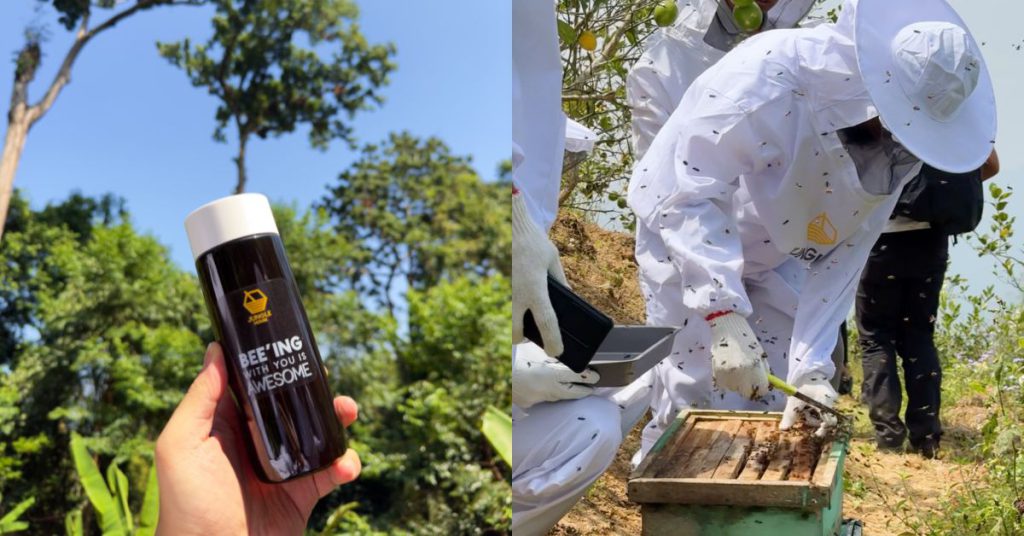
They’re also constantly developing new products, from honey-infused cakes to unique honey gift sets. This spirit of innovation keeps them relevant in a competitive market and ensures they stay true to their mission of making honey a lifestyle choice, not just a medicinal remedy.
Jungle House is now at a crossroads, where they’re looking beyond retail expansion.
Paul and Ashley are taking a more strategic approach by building a manufacturing facility that complies with halal, HACCP, and GMP standards.
“With the Malay market and also the overseas market available, we believe that it will give us a broader reach of our target audience and open up the awareness about the brand better,” they noted.
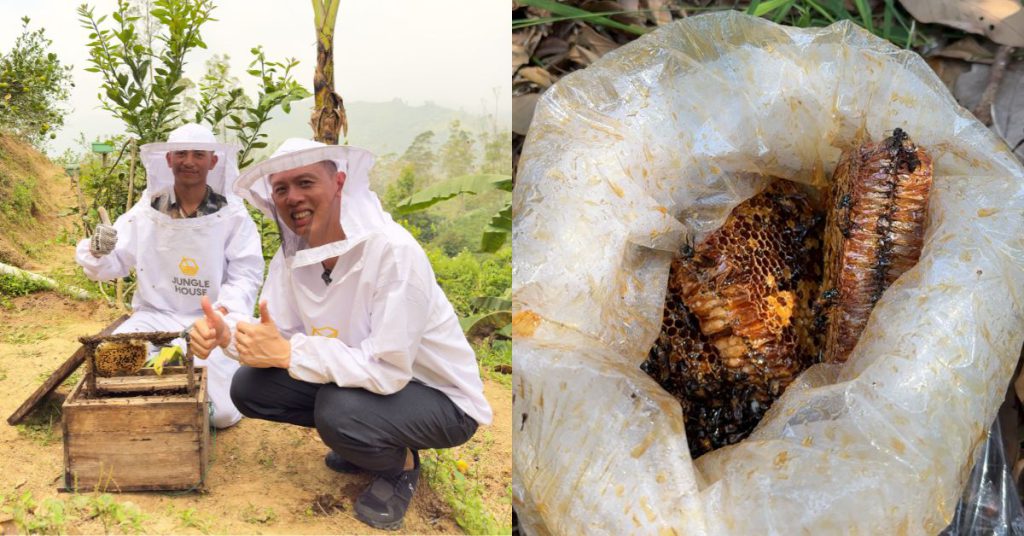
Saving bees, saving the world
At Jungle House, selling honey is about more than just business. They are passionate advocates for sustainability.
While many may still view honey as a remedy for sore throats or a sweetener for tea, Jungle House is on a mission to change that perception. Honey, they believe, is a superfood rich in health benefits and should be consumed daily as part of a healthy lifestyle.
Through their “Save the Bees, Save the World” campaign, they hope to raise awareness about the importance of bees and their contribution to food security and biodiversity.
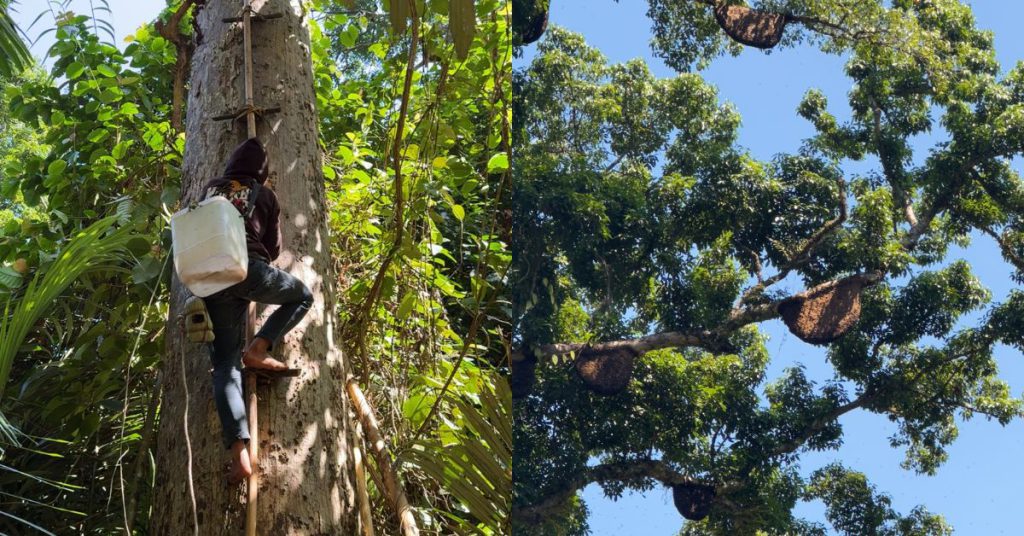
“Every time a customer walks into our store, we spend 20 to 30 minutes sharing the story of honey: how it’s harvested, the different varieties, their unique benefits, and the crucial role honey plays in our ecosystem,” they said.
This educational approach has helped create a community of honey lovers who are as passionate about sustainability as the founders themselves.
Paul and Ashley know that building a brand in a niche market like honey takes time, patience, and persistence. While no blueprint for success exists in the raw, organic honey business, they remain committed to the long haul.
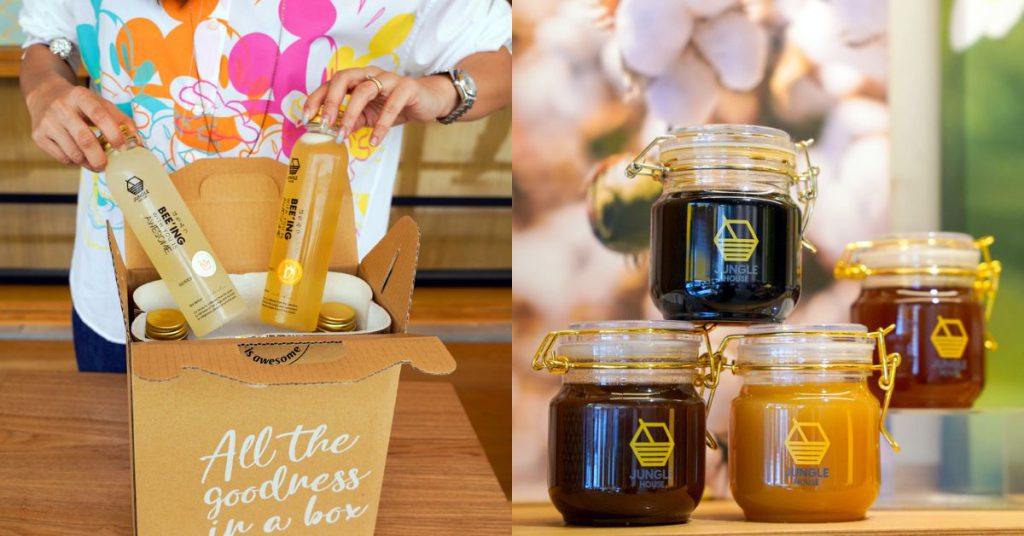
For them, each setback is seen as a stepping stone, not a failure. The closure of the Bangsar cafe? A lesson learnt. The pandemic’s impact on retail sales? A reason to explore ecommerce and new product offerings.
Their long-term vision includes not only expanding their retail presence but also ensuring that their supply chain—from farmers to consumers—grows sustainably. By nurturing the land and the people who work with it, Jungle House is setting itself up for growth that’s in harmony with nature.
- You can learn more about Jungle House here.
- Read other articles we’ve written about Malaysian startups here.
Also Read: SDEC 2024 will explore the latest trends in semicon, AI & ecommerce, here’s how to join
Featured Image Credit: Jungle House